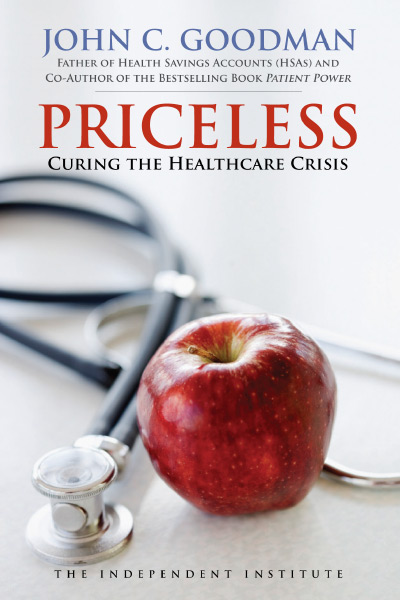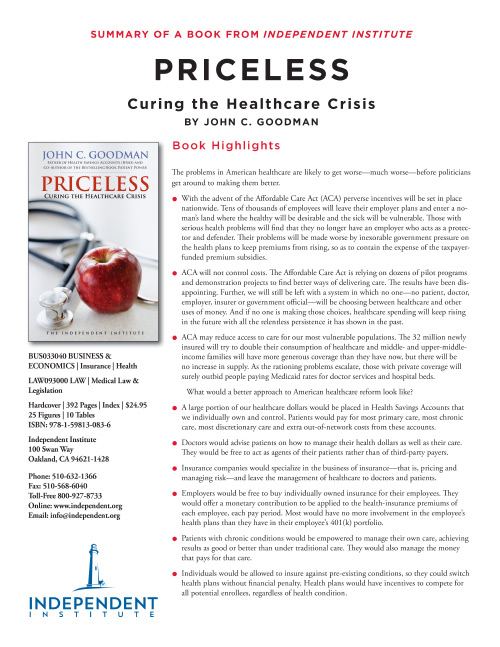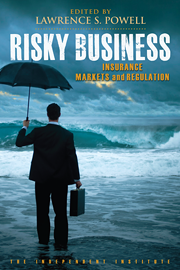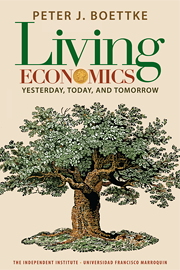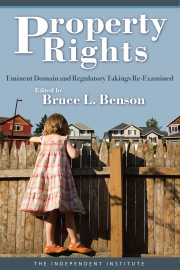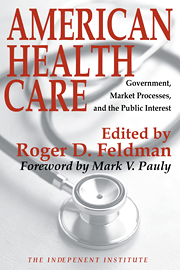| List Price: | $28.95 |
| List Price: | $28.95 |
Overview
In the groundbreaking book Priceless, John C. Goodman reveals how healthcare is a “complex system” that cannot be managed from the top down. True reform requires liberating doctors and patients by allowing them to interact in innovative ways to help meet unique individual medical needs.
The most important problems that plague American healthcare arise because we are trapped. Virtually all of us—patients, doctors, caregivers, employers, employees, etc.—are locked into a system fraught with perverse incentives that raise the cost of healthcare, reduce its quality, and make care less accessible than it should be.
Unfortunately, conventional thinking about how to fix those problems is marred by two false beliefs. The first is the idea that to make healthcare accessible it must be free at the point of delivery. The second is the idea that to make health insurance fair, premiums should not reflect real risks. Both ideas are the reason no one ever faces a real price for anything in the medical marketplace.
Goodman demonstrates how these and other false beliefs have eliminated normal market forces from American healthcare, making it almost impossible to solve problems the way they are solved in other markets. Relying on a common-sense understanding of how markets work, Goodman offers an unconventional diagnosis that allows him to think outside the box and propose dozens of bold reforms that would liberate patients and caregivers from the trap of a third-party payment system that stands in the way of affordable, high-quality healthcare.
View Priceless Book Page
Contents
Preface
1. Introduction
Part I: Why We Are Trapped
2 How Healthcare Is Different
3 Why People Disagree About Health Policy
Part II: The Consequences of Being Trapped
4 What Being Trapped Means to You
5 Why Do We Spend So Much on Healthcare?
6 Why Is There a Problem with Quality?
7 Why Is There a Problem with Access to Care?
8 Why Can't You Buy Real Health Insurance?
Part III: Letting People Out of the Trap
9 Empowering Patients
10 Liberating Institutions
11 Designing Ideal Health Insurance
12 Solving the Problem of Patient Safety
13 The Do-No-Harm Approach to Public Polic1
Part IV: Letting Government Out of the Trap
14 Reforming Medicare
15 Reforming Medicaid
16 Understanding the New Healthcare Law
17 What Most Needs Repealing and Replacing in the New Healthcare Law
18 Conclusion
Notes
Index
About the Author
Detailed Summary
The problems in American healthcare are likely to get worse—much worse—before politicians get around to making them better.
- With the advent of the Patient Protection and Affordable Care Act (ACA), perverse incentives will be set in place nationwide. Tens of thousands of employees will leave their employer plans and enter a no-man’s land where the healthy will be desirable and the sick will be vulnerable. Those with serious health problems will find that they no longer have an employer who acts as a protector and defender. Their problems will be made worse by inexorable government pressure on the health plans to keep premiums from rising, so as to contain the expense of the taxpayer-funded premium subsidies.
- The ACA will not control costs. The Affordable Care Act is relying on dozens of pilot programs and demonstration projects to find better ways of delivering care. The results have been disappointing. Further, we will still be left with a system in which no one—no patient, doctor, employer, insurer or government official—will be choosing between healthcare and other uses of money. And if no one is making those choices, healthcare spending will keep rising in the future with all the relentless persistence it has shown in the past.
- The ACA may reduce access to care for our most vulnerable populations. The 32 million newly insured will try to double their consumption of healthcare and middle- and upper-middle-income families will have more generous coverage than they have now, but there will be no increase in supply. As the rationing problems escalate, those with private coverage will surely outbid people paying Medicaid rates for doctor services and hospital beds.
What would a better approach to American healthcare reform look like?
- A large portion of our healthcare dollars would be placed in Health Savings Accounts that we individually own and control. Patients would pay for most primary care, most chronic care, most discretionary care and extra out-of-network costs from these accounts.
- Doctors would advise patients on how to manage their health dollars as well as their care. They would be free to act as agents of their patients rather than of third-party payers.
- Insurance companies would specialize in the business of insurance—that is, pricing and managing risk—and leave the management of healthcare to doctors and patients.
- Employers would be free to buy individually owned insurance for their employees. They would offer a monetary contribution to be applied to the health-insurance premiums of each employee, each pay period. Most would have no more involvement in the employee’s health plans than they have in their employee’s 401(k) portfolio.
- Patients with chronic conditions would be empowered to manage their own care, achieving results as good or better than under traditional care. They would also manage the money that pays for that care.
- Individuals would be allowed to insure against pre-existing conditions, so they could switch health plans without financial penalty. Health plans would have incentives to compete for all potential enrollees, regardless of health condition.
The American healthcare system is plagued with problems that arise because we are trapped. Virtually all of us—patients, doctors, nurses, hospital administrators, employers, and employees—are locked into a system fraught with perverse incentives that raise the cost of healthcare, reduce its quality, and make care less accessible than it should be.
Unfortunately, conventional thinking about how to fix those problems is marred by two false beliefs. The first is the idea that to make health care accessible it must be free at the point of delivery. The second is the idea that to make health insurance fair, premiums should not reflect real risks. Both ideas are the reason no one ever faces a real price for anything in the medical marketplace.
In Priceless: Curing the Healthcare Crisis, John C. Goodman demonstrates how these and other false beliefs eliminated normal market forces from American healthcare, making it almost impossible to solve problems the way they are solved in other markets. Relying on a common-sense understanding of how markets work, Goodman offers an unconventional diagnosis that allows him to think outside the box and propose dozens of bold reforms that would liberate patients and caregivers from the trap of a third-party payment system that stands in the way of affordable, high-quality healthcare.
A New Approach to Health Policy
The healthcare system, according to Goodman, is a “complex system.” Its gargantuan size and countless subtle intricacies make it impossible for anyone to understand how it works in every detail.
Like the economy as a whole, our healthcare system is far too complex to manage from above. But unlike a free market, American healthcare lacks a genuine price system, the mechanism that coordinates the actions of buyers and sellers in other markets. Instead, due to decades of government intervention, American healthcare is dominated by unwieldy third-party bureaucracies (insurance companies, employers, and the government) and by arbitrary payment formulas that have none of the helpful properties of market prices.
Because normal market forces have been systematically suppressed, everyone in the healthcare system faces perverse incentives that make our problems worse. Since healthcare is largely free at the point of delivery, patients are encouraged to over-consume it. Doctors are in danger of becoming agents of third-party payers, rather than agents of their patients. They are increasingly encouraged to practice “cookbook” medicine, rather than to find creative ways to improve quality and reduce costs. Employers face perverse incentives to hire the healthy and avoid the unhealthy. Health insurance companies in the soon-to-be-created health insurance exchanges will face perverse incentives to over-provide care to the healthy and under-provide to the sick.
Four Core Problems
As in other developed countries, perverse incentives in healthcare have created problems of cost, quality, access, and lack of real insurance, Goodman explains.
Costs have escalated largely because the overwhelming bulk of payments to physicians and hospitals comes from third-party payers. For every dollar that patients spend at a doctor’s office, on average only ten cents comes out of their own pockets. This huge gap creates incentives to consume healthcare up to the point where the extra benefit is worth to patients only ten cents for every dollar paid on their behalf. In addition, healthcare providers have incentives not to search for ways to reduce prices, as producers in other markets do, but to exploit third-party payment formulas.
Quality of care also suffers. By one estimate, adverse medical events kill as many as 187,000 patients each year, and non-lethal mistakes cause an estimated six million injuries per year. Quality varies considerably from provider to provider and is unrelated to what we spend. Why, then, don’t the better hospitals compete more on quality, as producers in other markets do? Again, the incentive structure of the third-party system is to blame. When providers do not compete for patients based on price they don't compete on quality either.
The problem of access to healthcare is widely misunderstood. For most people the obstacle isn’t so much the price of care in terms of money, it’s the price in terms of time (the time it takes to schedule and wait for a medical appointment, the time needed to travel to and from it, and so on). This “time price” of care is more burdensome for people with less income than for those with high levels of income. Unfortunately, most healthcare programs designed to eliminate the money price of care cause the “time price” of care to be much higher than it would have been.
Unlike casualty insurers, health insurers rarely tell potential customers that they need their product to help them in the event of a medical catastrophe. Instead they tend to advertise the services that healthy people want, such as wellness checkups, preventive care, and exercise facilities. Why? Because the health-insurance market is an artificial market in which the product offered is not real insurance. It more resembles prepayment for the consumption of healthcare.
The ACA
The Patient Protection and Affordable Care Act—a.k.a. ObamaCare—is a Rube Goldberg contraption, the result of a special-interest feeding frenzy. Its individual mandates will force us to buy something whose cost is rising faster than our incomes and will eventually crowd out every other form of consumption. Its bizarre system of employer mandates (including a $6-an-hour health minimum wage) and away-from-work subsidies will eventually force a complete restructuring of American industry.
It also creates perverse incentives. Its health insurance exchanges, for example, give insurers incentives to over-provide to healthy enrollees and under-provide to unhealthy ones.
The ACA will leave our social-safety net in tatters as the demand for medical services outstrips the supply. It will create severe problems of access to care for the elderly and the disabled as Medicare payments are cut. By 2020, Medicare nationwide will pay doctors and hospitals less than what Medicaid pays, and by the time today's college students reach retirement, Medicare will be one-third gone.
Which changes are needed most to turn an unworkable health reform effort into genuine health reform? Goodman offers several, including replacement of the bizarre system of subsidies and penalties with a uniform, refundable tax credit (say, $2,500 for every adult and $8,000 for a family of four) to fund the core insurance we want everyone to have.
Goodman also argues that the insurance mandate should be dropped. If people choose to remain uninsured, their unclaimed tax credit could go to a local safety-net institution and used when the uninsured cannot pay their medical bills.
Reforms that Work
Goodman also offers a host of ideas that, if adopted, would enable doctors and patients to use their intelligence and creativity to make the changes needed to create access to low-cost, high-quality healthcare. Doctors, for example, would be free to repackage and re-price their services in patient-pleasing ways, rather than conform to the dictates of third-party-payer bureaucracies.
The widespread adoption of Health Savings Accounts would cut costs by 30 percent or more. Individuals would be responsible for their own primary care, most diagnostic tests, and inexpensive outpatient care. Insurers would pay for inpatient care by using a value-based purchasing approach, under which the insurer pays only the amount that will cover low-cost, high-quality care and patients pay the full extra cost if they choose to patronize other providers.
Medicare could be reformed in several ways. The perverse incentives for doctors to provide care that is too costly, too risky, and inappropriate could be eliminated. We could also reduce the misallocation of medical skills that arises from Medicare overpaying for some skills and underpaying for others. Doctors should be able to get paid in different ways so long as the cost to the taxpayer falls and the quality of care increases.
Medicaid perpetuates a two-tier healthcare system—an inferior one for the poor and a better one for everyone else. Ideally, Medicaid would be abolished and the savings would go to subsidize private insurance for low-income families. If that is too radical for the body politic, there are other alternatives. For example, Medicaid could get out of the business of dictating prices and instead oversee a Health Stamp program, fashioned after the Food Stamp program. Enrollees would be free to add their own money to the value of the stamps and purchase services in the larger medical marketplace. Low-income families on Medicaid could then compete on a level playing field with other patients for healthcare resources.
Patient safety could be improved. One way that Goodman discusses is to create an alternative to malpractice litigation: allow patients, doctors and hospitals to enter into voluntary, no-fault contracts. In return for forgoing their common-law rights to litigate, patients would be assured that if they experience an adverse outcome for a reason other than the medical condition for which they seek care (whether or not malpractice is involved), the provider institution will write them a check, without lawyers, without depositions, without judges and juries—no questions asked.
After discussing these and many other promising reforms, Priceless concludes with a discussion of two principles that must be applied in order to significantly improve the markets for healthcare and health insurance. First, prices must be allowed to reflect marginal social costs, where possible through the operation of market competition. Second, health insurance premiums should be able to reflect real risks in a market in which people would be able to insure against the onset of pre-existing conditions. The adoption of these principles would help enormously to bring about higher quality healthcare at an affordable cost.
Praise
“I have been following John Goodman’s health policy ideas for as long as I’ve been on Capitol Hill. John’s latest effort, Priceless: Curing the Health Care Crisis, makes it abundantly clear why he is a source of wisdom, insight, and innovative thinking.”
—Paul Ryan, Chairman, U.S. House Budget Committee
“John Goodman’s book Priceless provides more good thinking from the person who taught us that incentives matter.”
—Michael O. Leavitt, former Governor of Utah; former Secretary, U.S. Department of Health and Human Services; former Administrator, U.S. Environmental Protection Agency
“With his head for the practical and his heart for the disadvantaged, John Goodman has long been the clearest and most insightful healthcare thinker we have. Now that our perverse, accidental ‘insurance’ system has reached its inevitable crisis, it’s time we acted on his common sense, fact-based wisdom in Priceless.”
—Mitch Daniels, President, Purdue University; former Governor of Indiana
“Priceless is an important contribution to a market-friendly approach to reforming health care.”
—Martin S. Feldstein, George F. Baker Professor of Economics, Harvard University; President Emeritus, National Bureau of Economic Research
“If liberal commentators wish to sharpen their claws, there is no better stone on which to do it than John Goodman’s book Priceless.”
—Uwe E. Reinhardt, James Madison Professor of Political Economy and Professor of Economics and Public Affairs, Princeton University; former Commissioner, Physician Payment Review Commission
“While many people discuss the problems within our healthcare system, few propose real solutions. John Goodman has written a book that not only accurately describes what is happening with healthcare in our nation, it provides key solutions and answers to a problem that so desperately needs to be corrected.”
—Jeb Bush, former Governor of Florida
“After a year of congressional debate, 2,000 and some-odd pages of legislation, and a Supreme Court verdict, few issues remain more contentious than President Obama’s 2010 Patient Protection and Affordable Care Act, dubbed ‘Obamacare.’ . . . Priceless is required reading on the subject. . . . The central theme of Priceless is that patients, doctors, insurers, and employers should be freed of government encumbrances to interact in the marketplace. Patients should be able to check physician fees to choose combinations of quality, cost and amenities. Doctors should be rewarded for finding innovative ways to lower costs. Insurers should be able to charge premiums that reflect risk, to enable them to service high-risk customers. Employers should be allowed to negotiate portable insurance policies for their employees, one way to help patients with pre-existing conditions. . . . For better solutions to this and other problems of providing affordable health care, Ryan, Obama, Romney, and Biden should all read this book.”
—Barron’s
“John Goodman, widely known as the father of health savings accounts, is as provocative and controversial as ever in his timely and important, new book, Priceless: Curing the Healthcare Crisis. His prescription for fixing what ails American health care is to free American consumers to seek the health care that best suits their needs and to free physicians and hospital administrators to provide the best, lowest cost care they can by getting rid of the constraints and disincentives provided by insurance companies and public payers. Essential reading for all who have been frustrated in their search for a workable solution to our health care woes.”
—Gail R. Wilensky, Senior Fellow, Project HOPE; former Administrator, Centers for Medicare and Medicaid Services
“Instead of keeping the market from dealing with preexisting conditions, health care economist John C. Goodman argues, we should encourage it. In a new book, Priceless: Curing the Healthcare Crisis, Goodman offers an abundance of ways in which an unfettered market could address the problems of people with chronic medical needs. One proposal: Employers could buy health insurance that was fully portable—employees would own their policies and could take them from job to job. Another idea: Health Savings Accounts for the chronically ill that would allow disabled patients to manage their own budgets and choose the goods and services that best meet their needs. Still another: ‘health status insurance,’ which would allow individuals to protect themselves against the risk that a preexisting condition could emerge down the road and cause their insurance premiums to rise. What America’s health care landscape needs is more freedom and competition, not less.”
—Boston Globe
“John Goodman has been developing innovative ideas on how to create a better health system, a less expensive health system, a health system with more access for well over two decades. He really was the creator of the health-savings-account model and developed that entire initiative to try to give people increased resources and increased control over their health.”
—Newt Gingrich, 58th Speaker of the U.S. House of Representatives
“There’s no question that today’s health care system is littered with distorted incentives and what John Goodman calls dysfunctionality. This book is a call to arms to do something about it. Even if you don’t agree with all of Goodman’s ideas—and there are plenty I disagree with—you should read this book if you want to be an informed participant in the debate over the future of health care in this country.”
—Peter R. Orszag, former Director, Congressional Budget Office; Vice Chairman, Global Banking, Citigroup, Inc.
“Some might object that all omelets, good or bad, require the breaking of eggs. Granting that the Affordable Care Act involves some dismal economics, what is the alternative to providing affordable care? For alternatives that would move in the direction of free markets, try the recently published Priceless: Curing the Healthcare Crisis, by John C. Goodman. Just for starters, Goodman would ‘liberate the supply side of the market’ by legally permitting nurses and other lower-level personnel to perform a range of services that now require the participation of much scarcer physicians. By increasing the opportunities for these people, we might induce far more supply. That’s another law of economics.”
—Barron’s
“Priceless makes a very persuasive case that liberating people is the key to health reform. When we free the patients and the healthcare professionals from payer and government shackles, we will drive quality up and price down and eliminate an enormous amount of waste.”
—Stephen B. Bonner, President and Chief Executive Officer, Cancer Treatment Centers of America
“John Goodman is always interesting, always provocative. His ideas are not to be ignored.”
—Jim Cooper, U.S. Congressman (D-TN)
“Priceless illustrates the importance of market-based solutions to drive affordability, access, and higher quality experience for today’s empowered healthcare consumers.”
—Angela F. Braly, former Chairman and Chief Executive Officer, WellPoint, Inc.
“Priceless is unique in that it combines a general discussion of the issues in health; access, cost and quality, with specific implications of the Patient Protection and Affordable Act of 2009 on these same issues. The book is provocative and instructive, a combination that is difficult to pull off but done here in John Goodman’s style of combining humor with fact. This book should be on the reading list for everyone interested in healthcare reform.”
—Thomas R. Saving, Jeff Montgomery Professor of Economics and Director of Private Enterprise Research Center, Texas A & M University
“Thirteen years ago I co-authored a book that I thought could cut the Gordian knot of the health care dilemma. The dozens of copies sold proved insufficient to promote the needed revolutionary change. John C. Goodman has now written the book that can do the job. He presents as clear an answer as we are ever likely to see, along with examples from the real world. It’s now our job to make the case in a politically effective way. New thinking is necessary, and Goodman provides it. He argues that a free-market approach is essential; health care must be bought with money that most consumers have reason to see as their own. And while most people would respond to such a proposal with an incredulous roll of the eyes, this perception must change. Goodman’s wonderful volume considers both the theoretical and the practical Economic principles, clearly stated, form the basis for discussion. Policy recommendations include strategic thinking and tactical objectives. Goodman tells us how it all can work, and what political decisions will be required. . . . A cornerstone of his analysis is that incentives are more efficient than rules for channeling behavior toward optional solutions. Yet, curiously, this perspective is controversial: Many prefer the authoritarian approach, assuming that incentives will not protect us from individual folly, and will lead us where they intend us to go. . . . Goodman argues persuasively that a private-sector approach is the only solution for the long term. . . . Goodman is a master of clarity. . . . The vigorous pursuit of individual liberty produces a self-correcting system in which increasing equality can occur: John C. Goodman has charted the path.”
—The Weekly Standard
“With Priceless, John Goodman has written a path-breaking book that everyone should read.”
—William A. Archer, Jr. , former U.S. Congressman and Chairman, House Ways and Means Committee
“In a health policy world dominated by old tarnished ideas recycled under new acronyms, it is a pleasure to read Priceless that goes back to first principles, defies pigeonholing, and ends up with imaginative yet eminently practical proposals for reform.”
—Mark V. Pauly, Bendheim Professor; Professor of Health Care Management, and Professor of Business and Public Policy Wharton School; University of Pennsylvania; former Commissioner, Physician Payment Review Commission
“John Goodman is one of the nation’s top thinkers in healthcare policy. His new book, Priceless, will be an important resource for policy makers in Washington and around the country.”
—Kay Bailey Hutchison, U.S. Senator (R-TX)
“John Goodman is a highly influential health policy analyst, organization leader, and entrepreneur whose ideas are always provocative and simply can’t be ignored. You may not agree with every proposal he makes, but he is right on target when he notes that future solutions to unsustainable health-cost growth must convince consumers and patients that they gain from those reforms.”
—C. Eugene Steuerle, Institute Fellow and Richard B. Fisher Chair, Urban Institute
“In Priceless, Goodman argues that doctors are trapped in a dysfunctional system and they need to be liberated. He’s right. Restore liberty. End coercion.”
—Donald J. Palmisano, former President, American Medical Association
“In Priceless: Curing the Healthcare Crisis, John Goodman explains why so many Americans—the sick, the healthy, consumers, employers, medical professionals and insurers—feel trapped by the U.S. health care system. Thankfully, he demonstrates that there are ways to escape the health-care traps, and his solutions deserve serious attention, regardless of one’s political persuasions.”
—John Engler, President, Business Roundtable; former Governor of Michigan
“In the sea of perplexity and inefficiency that characterizes health policy, John Goodman’s new book, Priceless, provides fresh and original insights to help steer us into a system that harnesses individual choice, aligns price and quality, and more effectively utilizes financing to achieve these ends.”
—June E. O’Neill, Wollman Distinguished Professor of Economics and Director of the Center for the Study of Business and Government, Baruch College; former Director, Congressional Budget Office
“John Goodman’s terrific book Priceless is indeed priceless. It offers a breath of fresh air in a tired healthcare debate that demonstrates once again that markets enjoy their greatest advantage in complex settings that call for imaginative solutions that no government-driven system can deliver. Critics may carp that healthcare markets are never perfectly competitive. Goodman offers chapter and verse to explain why market innovation beats top-down schemes by a mile—ACA especially included.”
—Richard A. Epstein, Laurence A. Tisch Professor of Law, New York University
“In Priceless, John Goodman provides a much needed perspective on healthcare issues—he is the leading proponent of using market-based reforms to solve health policy problems.”
—Kevin M. Murphy, George J. Stigler Distinguished Service Professor of Economics, U. of Chicago
“John Goodman’s analysis is incisive and compelling. The insight and innovative thinking in Priceless will be invaluable in avoiding the harms of government-run healthcare.”
—Steve Forbes, Chairman and Editor-in-Chief, Forbes Media
“John Goodman’s timely and important book Priceless has much to like. The presentation of healthcare economics is clear as is the discussion of the perverse incentives in health care. Good writing and clear explanations have always been hallmarks of Goodman’s writing. I particularly like three aspects of this book: the consideration of the role of time prices and the surprising winners and losers that immerge from the healthcare reform legislation; the analysis of the political economy of healthcare systems and Goodman’s explanation of why European systems look and act so differently from ours; and the policy prescriptions to reform health insurance, Medicare and Medicaid. Anyone seriously interested in understanding healthcare reform should look carefully at the proposals offered here.”
—Michael A. Morrisey, Professor of Health Economics and Health Insurance and Director of the Lister Hill Center for Health Policy, University of Alabama at Birmingham
“I have not agreed with Goodman’s emphasis on high-deductible health insurance in health care... But no one who is serious about health reform can afford to ignore the ideas in Priceless.”
—Alain C. Enthoven, Eccles Professor of Public and Private Management Emeritus, Stanford University
“In Priceless, John Goodman’s challenge to the conventional wisdom of a health care system broken because of excessive freedom can not be more timely. As we stand on the brink of hyper-regulating our system further, Goodman cogently argues that our answer is to free our system from the traps policymakers, insurers and providers have built over the decades.”
—Stephen T. Parente, Professor of Finance and Director of the Medical Industry Leadership Institute, University of Minnesota
“John Goodman explains in Priceless why the health sector is so dysfunctional and why problems cannot be solved by adding even more layers of government bureaucracy, regulation, and price distortion. Goodman brings his clear thinking as an economist to explain how we could employ market forces in health care to realign incentives so patients, doctors, and all of the players in the health care marketplace are seeking greater efficiency, higher quality, and better value.”
—Grace-Marie Turner, President, Galen Institute
“From the author of Patient Power, Priceless is a new book about why we need to empower doctors as well as patients.”
—Daniel H. Johnson, Jr., M.D., former President, American Medical Association; former President, World Medical Association
“Everyone who wants to understand the mess Washington has made of health policy should read John Goodman’s incisive book, Priceless. Generations of health reformers have tried to engineer a new system based on regulation and centralized control, only to find higher cost for health care that too often fails to provide value to patients. Goodman has a better idea: replace the perverse economic incentives of first dollar coverage and top-down regulation with real insurance, and let competition work.”
—Joseph R. Antos, Wilson H. Taylor Scholar in Health Care and Retirement Policy, American Enterprise Institute
“Too many American health economists have looked to government to solve healthcare problems, without realizing that government is the fundamental cause of these problems. John Goodman is the welcome exception and his innovative work has been influential in his creation of health savings accounts. His book Priceless is now full of equally useful ideas for restoring healthcare to the market, and when the ACA disappears this book will provide the framework for truly reforming healthcare for all.”
—Paul H. Rubin, Samuel Candler Dobbs Professor of Economics, Emory University
“America is in perilous times. In Priceless: Curing the Healthcare Crisis John Goodman deftly explains how to jettison the overgrown dysfunctional gridlock that prevents reform of healthcare and healthcare entitlements.”
—Earl L. Grinols, Distinguished Professor of Economics and Director of Doctoral Programs Development, Robbins Institute for Health Policy and Leadership, Baylor University
“Goodman has just published a new book, Priceless: Curing the Healthcare Crisis, which offers the prospect of a worldwide revolution in health care policy. With the Supreme Court about to rule on Obamacare, this book could not be more timely. . . . In more concrete terms, the revolution begins with Health Savings Accounts (HSAs), which involve health insurance paying all expenses above an annual deductible of preferably $2,500 to $5,000 or possibly more. That insurance is much less expensive with those high deductibles alone, and the savings is put in the HSA savings account and used to pay health expenses below the deductible. Whatever is not spent stays in the account earning interest to pay for future expenses, and can be withdrawn and used for anything in retirement. . . . Such HSAs can be expanded throughout the entire health care sector. . . . In this book Priceless, Goodman opens up the vista for how health care providers, doctors, hospitals, specialists, etc. can and will respond to patients with such incentives. . . . But the health care providers must be freed of the barriers that are currently preventing them from serving patients this way. . . . Today, while America enjoys the best and most advanced health care in the world, it can best be described as an East German caricature of the maximum, 21st century, fully capitalist health care that our modern science could support.”
—American Spectator
“Goodman’s Priceless: Curing the Healthcare Crisis is an excellent treatise on the healthcare industry and how our political solutions are making that world increasingly perverse, ineffective, and stagnant. . . . In my work I am consistently struck by how many great healthcare delivery ideas are illegal and Goodman showcases many examples of healthcare entrepreneurship which aren’t allowed to take off because of the regulatory environment and the entrenchment of major players. Goodman at once lays a strong foundation for healthcare as a system “too complex for any single individual (or group of individuals) to grasp or understand” and makes a strong case for how much hubris policy has had in trying to address the problems of the industry. Herein lies the most powerful lesson of the book: while it is impossible that any entrepreneur will devise an overarching solution for our healthcare problems we have forgotten how to let process innovators test solutions and chip away at problems the way they do to roaring success in other industries. Goodman pinpoints various turns the US has taken to bring existing private coverage and provision of services under the government umbrella. Woven together, these examples provide a vivid picture of systematically government payers have crowded out private sector solutions. . . . Goodman is not shy about exposing the politics of healthcare and how it stands in the way of treating those who need care the most, including the poor and elderly, but this book is no exercise in partisanship. . . . Goodman has a strong grasp of realities such as the fact that many acute care services will always be sticky to being provided locally but that ambulatory and elective procedures make up the majority of the market and have the potential for reinventing how healthcare is delivered. Many will disagree with the ideas presented but the book will push the thinking of anyone involved in healthcare. This is especially true since Goodman has a thoroughgoing understanding of healthcare as an industry, a quality which most of the loudest voices in policy sorely lack.”
—Marginal Revolution
“This book takes an extensive but not exhaustive look at the current state of American medicine, the perverse incentives caused by government interference (primarily the discriminatory tax code and various rules and regulations at the federal and state level), and what policy changes Goodman thinks would help. . . . If you are a left-wing, pro-ObamaCare ideologue, you are not going to like this book. Virtually every myth espoused by the proponents of national healthcare receives the flogging it deserves with Goodman’s painstaking analysis.”
—Journal of American Physicians and Surgeons
“I recently read a very interesting book by John Goodman titled Priceless: Curing the Healthcare Crisis. Whereas President Obama’s Health Reform plan focuses on increasing access to medical services by expanding the government’s role in the medical marketplace, Goodman advocates reducing regulation and adding flexibility to the health insurance and medical markets. The book is interesting throughout. In this book, Goodman—who has been called the “Father of Health Savings Accounts”—points out THE major problem with public insurance programs: the prices paid from services are incorrect. Special interests (e.g., PhARMA, physician specialty groups, patient advocate groups) have a significant influence over the relative prices paid for medical services. These prices typically do not reflect the true cost to treat a patient. These imprecise prices leads to distortionary behavior and an inefficient allocation of resources. Not only does overinsurnace lead to a moral hazard problem, but providers shift the services they provide patients based on rent-seeking behavior rather than competitions for patients. There has been much praise for this book My impression is that it provides a new vision for how health insurance would work. The current approach where the government funds a larger and larger share of healthcare costs is not fiscally sustainable. I don’t agree with all of Goodman’s points, but his market-driven, deregulated approach does offer an appealing option to the current status quo.”
—Healthcare Economist
“Whether Mitt Romney wins the presidency or President Obama is re-elected, they and Congress would be well advised to read and digest John Goodman’s book Priceless. Whoever is president will soon find himself facing unintended, but often predictable, consequences of the new health care law and also of previous laws. Whether the issue is Medicare or Medicaid, health savings accounts, the tax treatment of health insurance, ths costs and effects of preventive health care, the wastefulness of ‘single payer’ health care systems, or the perverse effects of Obamacare, Goodman brings an encyclopedic knowledge to the issue. A reader who is skeptical of his claims can check one of the literally hundreds of studies and government documents that he footnotes. Goodman alternates between being an idealist who wants to get government out of health care, and being a policy analyst who takes certain goals as given—such as having government give health care aid to low-income people—and considers more efficient ways of achieving them. So, whether you want to make a scase for complete separation of health care and state (as I do), of you’re a legislator who wants to make incremental improvements away from current dysfunctional health care policy, much in this book will inform and help you.”
—Regulation
“John Goodman offers a cure for what ails American healthcare. Proponents of the Affordable Care Act (ACA, aka Obamacare) operated high on ‘the ladder of abstraction,’ as some poor writers and preachers do. That’s why Nancy Pelosi and others said it wasn’t necessary to read the bill before voting for it: They were suite-level politicians voting for an abstract idea, not a program with counter-productive details at street level. John Goodman in Priceless: Curing the Healthcare Crisis (Independent Institute, 2012) illuminates the abstract engineering ideal that animated ACA proponents. . . . Priceless repeatedly shows that what on paper seems well-engineered does not work out as planners had hoped. . . . Goodman contrasts that engineering approach with an ‘economic approach’ that emphasizes individual decision-making. The operative word for Chapter 10, for example, is freedom: He writes of ‘freeing the doctor . . . the patient . . . the employee .... . . employer . . . the nontraditional workplace . . . the uninsured . . . the kids . . . the parents . . . the chronically ill . . . the retirees.’. . . Goodman has many insights. . . . He’s right about the need to improve the supply of medical personnel by providing additional incentives, rather than smothering doctors in bureaucratic reporting that kills for many the reason they originally entered medicine: to help others.”
—World Magazine
“Priceless covers what is arguably the most important service/product everyone purchases at some point—health care. This book was written by John Goodman, an economist who is sometimes referred to as the ‘father of Health Savings Accounts.’ Goodman’s book examines how interference in the health market has created perverse incentives as patients, doctors, insurers and other third parties try to make it all work. Professional licensing laws, tax laws, labor laws and employee benefit laws have created unintended consequences which have played a large part in creating the health care system we see today. These artificial laws create an atmosphere that attempts to defy and ignore economic laws. No matter how much we may want to, we simply can’t avoid basic economics. One of the best examples of this is the problem of pre-existing conditions. Goodman points out that ‘Most of the time, the problem of pre-existing conditions arises precisely because health insurance isn’t portable.’ . . . So if you are interested in learning more about health care, including how you will be affected by the Affordable Care Act, you may want to read this book.”
—Jeffersonville (IN) News and Tribune
“With health care issues playing an outsized role in North Carolina politics right now, I strongly urge Carolina Journal readers to put John Goodman’s recent book Priceless: Curing the Healthcare Crisis on your e-reader or reading stack. You won’t be sorry. Goodman . . . has been one of the country’s leading experts on the economics of health care for more than two decades. Back in the 1990s, his work on patient power and perverse incentives in the delivery of medical services helped set the stage for the creation of health savings accounts and the larger revolution of consumer-driven health care. In Priceless, Goodman discusses this revolution and many other topics related to health care reform. While you might not agree with every proposal he offers, you will learn a great deal about health care policy along the way.... Just about every page of John Goodman’s Priceless offers something that challenges the conventional wisdom, improves your understanding of health policy, or at least makes you think. Highly recommended.”
—Carolina Journal
“John C. Goodman’s Priceless tells the story of a health-care system largely controlled and undermined by the federal government, which is now poised to take over the rest of that system and finish the job of ruining it. The means of this death blow, of course, will be the Patient Protection and Affordable Care Act, or Obamacare—unless Republicans succeed in repealing it shortly after President Obama leaves office in 2017.”
—Claremont Review of Books
“Many thanks for Priceless: Curing the Healthcare Crisis I am pleased to have it and look forward to reading it. Your straightforward, commonsense approach is refreshing, and the book’s publication is well-timed. There is much to be done in providing affordable healthcare for Americans.”
—John Barrasso, M.D., U.S. Senator
Awards
2013 Independent Publisher Book Awards (“IPPY” Awards)
- Silver Winner in Health/Medicine/Nutrition
- Winner in “Culture” Category

